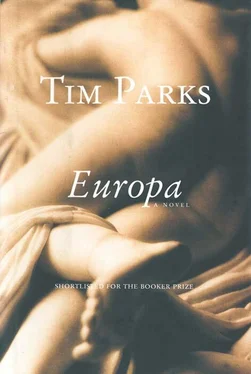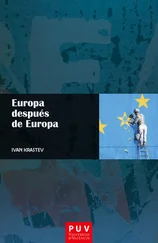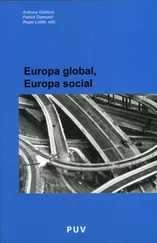I am not reading, I tell the girl in front of me.
But you have a book.
I insist to the perhaps twenty- or twenty-one-year-old girl that though this is self-evident, the fact is that I am not reading the book which, admittedly, I am holding open in my hands.
Why not?
Already, during the course of this brief exchange, I am aware of smiling wryly and generally sending out the kind of friendly, apparently avuncular social messages which I know are expected of me. It’s as if I had indeed been reading the book, but had now chosen to say that I was not reading it in order to tease and prolong the conversation, rather than just giving the girl the title of the thing and having done. Indeed it would not greatly surprise me if before very long I weren’t telling this pleasant young studentessa some small sad half-truths about myself merely in order to appear, as they say, interesting.
I explain to her that I am not reading the novel I hold in my hands, because I already know it to be a tiresome thing written by a woman who can think of nothing better to do with her very considerable talent than prolong a weary dialectic which presents the authorities as always evil and wrong and her magical-realist, lesbian, ethnic-minority self and assorted revolutionary company as always good and right and engaged, what’s more, in a heroic battle where LIFE will one day triumph over the evils and violence of an uncomprehending establishment.
Again I smile, warmly, to show that I am perfectly aware that this fierce demolition will seem pompous and presumptuous and even fascist, whereas what I really feel is that my criticism, far from exaggerated, is, if anything, inadequate, since what needs to be said is that people who do nothing more than analyse the world in a way in which it has grown used to being analysed, offering their readers the illusion of participating in a movement that gives them a sense of moral superiority with regard to a society they have no intention of ceasing to subscribe to (as indeed why should they?) — people, whether writers or not, of this variety deserve nothing better than scorn and perhaps a good deal worse.
But it would be unwise to say this. It would be, I have discovered, and indeed it generally is, unwise to say almost any of the things one feels most moved to say. Unless you can somehow present them as a joke.
So why are you reading it? she asks me.
In a pantomime of patience I explain that, as I have already explained, I am not reading it.
But you’ve got it open.
It was given to me.
She looks at me with big young eyes, wondering if she can ask the question, and perhaps because we’re on a coach and hence all part of the same group supporting the same cause, my cause, she feels she can. Who by?
I tell her: Somebody who wanted me to read it.
Clearly she is being teased, and clearly she enjoys being teased. She bounces up and down on her knees, she is young, she smiles, she raises an eyebrow (endearingly bushy), she cocks her head to one side, smooth cheek for just a moment against the synthetic stiff blood-red of the upholstery. Immediately I’m thinking that if I don’t tell her who gave me this book, with all that the two words involved would imply, perhaps I’ll have more of a chance with this young student, a thought which equally immediately short-circuits to have me thinking, uncomfortably, of Georg and of her , so expert in the withholding of information, so that in the kind of reflex that isn’t so much a decision as a small convulsion of self-recognition followed by fearful rejection (as of one throwing away a cigarette after the first puff), I decide I will tell her who gave me this miserable novel. I will tell her so as to save myself from all equivocation. Just as I open my mouth, she asks, Your girl-friend?
What?
Was it your girl-friend gave you the book?
She smiles warmly She is being bolder now. She has noticed — I saw her eyes — that I don’t wear a ring.! close my mouth, hesitating again, when our conversations if such we are to call it, is interrupted by an announcement. Vikram Griffiths is standing in the aisle of the coach up front by the driver and he has a microphone in his hand and his mongrel dog at his feet. His voice is harshly electronically deep, and deeply Welsh: Welcome to y’all! he begins, benvenuti, bienvenus, wilkommen, croeso , good t’see ya!
When Vikram Griffiths begins to speak, the girl in the seat in front of me, whose great brown eyes are of course like those of a million other Italian girls, not to mention Spanish and Greek and doubtless other races too, by which I mean to say, unique, splendid, eminently replaceable, swivels on her seat to pay attention, and what I’m telling myself now, slightly right of centre in the back seat of this packed coach, assailed by Vikram Griffiths’ efficiently amplified, demotic voice, what I’m telling myself is that I truly am in this now , in this coach I mean, like it or not, for twelve hours and then the two nights in Strasbourg and then twelve hours in the coach again on the way back, not to mention the danger that it could well be more than twelve hours, depending on traffic and circumstances beyond your control, since of course the moment you set out on the road with other people, the moment you undertake a trip together in a coach, the moment you commit yourself to some joint project, some communal enterprise, circumstances are always well and truly beyond your control.
I’m in. Deeply, inescapably in. We’ve already left Milan behind, we’re on the autostrada , speeding along, a solid group of us, so that, as when they bolt the doors on the plane and it moves out onto the runway, there can be no more getting out now before the other end, no more splitting us up into separate sovereign urges and desires. You’re in it now, I tell myself, with all these young students, girls for the most part, to either side and in front, beautiful and plain, and Georg next-but-one to my left, plus your other colleagues, liked and disliked, but mostly the latter, from France and Germany and Spain and Greece and God bless us even Ireland, and with her in the third seat from the front, with her dark brown hair and dark brown document-case that she just took down from the overhead rack, the same case where she used to keep such things as her train timetable and the rubbers we used and the photographs we took of ourselves with the time-delay, and then miscellaneous memorabilia of the air-ticket and hotel-bill variety, the receipts for meals I always had to be careful not to put in my own pockets, and my letters of course, my many many letters, some of them ten or even twenty pages long, some of them no more than fragments of poor poetry I had written, or better poetry I had copied out for her but which she never recognized, and later an aerosol can — of ammonia spray, as is the way with things that are intense and have to change, things that start well but can’t stand still and end badly, very badly, though now no doubt she will have nothing more in there than notepaper for the reflections she is gathering and will be using this trip to gather further, for her research into a possible constitution for a United Europe which is part of a competition she has enrolled in to win a Euro scholarship for a year’s work and study in Brussels, or so I heard from my daughter, a move that she sees as the indispensable next step in her career, for she still thinks of life in terms of career and self-realization, she is still at that stage.
Yes, I am in this now, with all the singing and the toilet stops and the making friends and the exchanging of addresses and the boredom and doubtless the confabulation as some try to grab more power and responsibility in our little group and others (myself) to refuse it, and the enormous waste of time it will no doubt be going through the bureaucratic procedure of presenting our petition to a European Parliament whose exact functions and powers and suffrage none of us understands, except perhaps her , perhaps the Avvocato Malerba, perhaps Vikram, and on the way back we will all have to discuss the importance of what we have achieved and mythologize it and tell ourselves we did well to come and that now we are safer, meaning that we can feel more secure that we will continue to receive our salaries for some time to come.
Читать дальше












